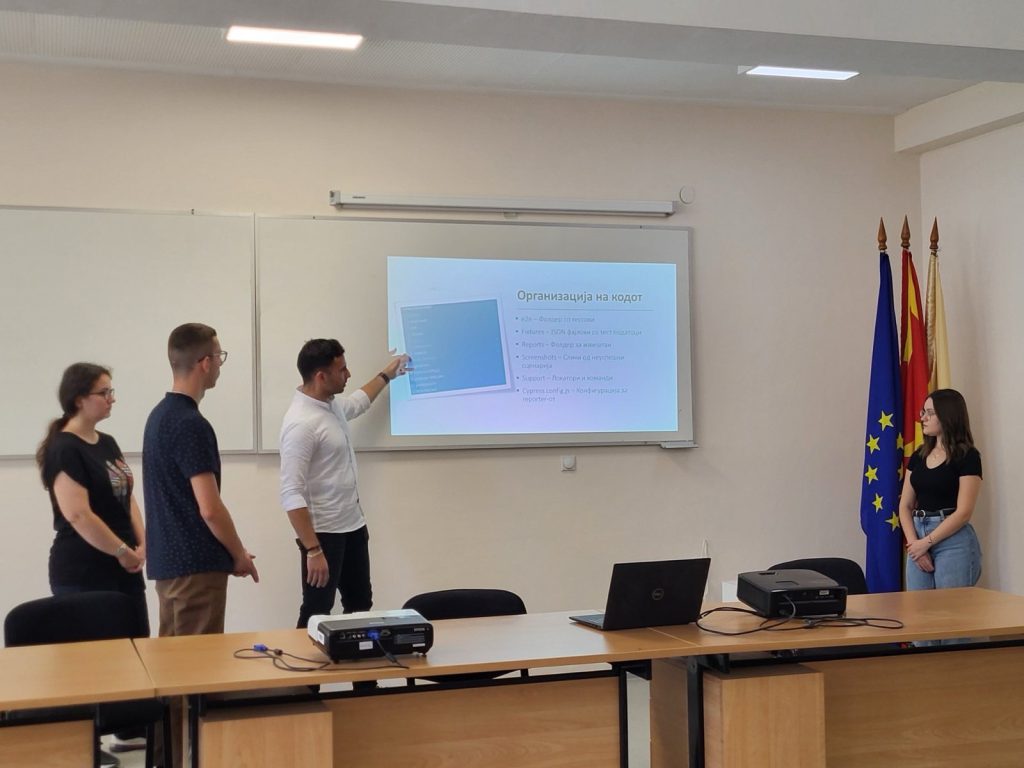Becoming a professor/mentor was always a dream of mine. It’s one of the main reasons I pursued my master’s degree in computer science — not just to learn more, but also to one day teach.
Recently, I had a chance to feel that dream by mentoring a group of students from the Faculty of Information and Communication Technologies – FICT in Bitola for one semester.
Mentoring a group of QA students has been one of the most rewarding (and eye-opening) experiences in my career.
How It All Started
The company where I am currently working, Scalefocus, had a collaboration with the Faculty of Information and Communication Technologies in Bitola. They were looking for a mentor from the industry to lead a group of students and teach them something practical and valuable related to software testing and QA.
When I heard it was about Quality Assurance, I knew I had to apply.
I’ve been passionate about QA for years — not just for the technical skills it requires, but also for the mindset it builds: detail-oriented, curious, and customer-focused.
This was my chance to bring that mindset to students who were just starting.
Once selected, I started building a program that would be suitable and interesting for the students — something that starts with strong fundamentals and ends with a hands-on project.
Here’s what our journey looked like:
- Phase 1: QA Fundamentals
- Phase 2: Manual Testing and Testing Documentation
- Phase 3: Automation with Cypress
- Final Project: Writing test cases for an e-commerce site, automating them by using Cypress, and finding and reporting real bugs
When I started, I thought my role was simple: teach them what I know.
But I quickly realized it’s not just about passing knowledge — it’s about inspiring curiosity, building confidence, and helping them find their own QA mindset.

What I Learned During That Semester
Mentoring doesn’t mean knowing everything. It means creating space for questions, encouraging mistakes, and modeling the curiosity and persistence that QA is all about.
It also reminded me why I love this field — because it’s not just about testing features, it’s about making software better for people.
Teaching made me a better professional. During the lectures, I had to explain complex things simply. Explaining something forces you to break it down and see it more clearly. It helped me understand QA even better.
Students bring a fresh perspective. Their questions challenged me and made me see things I usually take for granted. They made me revisit the “why” behind things I do automatically.
I realized that curiosity is contagious. The more passionate I was, the more excited they became. Once they understood that breaking things was good, they became more daring — and better testers. Helping students believe in themselves made a huge difference in how they performed.

Presenting at the Faculty
At the end of the semester, we presented our work to the faculty.
Each student walked through what they had learned, shared bugs they found, and demoed the automation scripts they wrote.
It wasn’t just a proud moment for them — it was a proud moment for me, too. Seeing their growth, their confidence, and their excitement about QA reminded me why I love this field.

Final Thoughts
Mentoring this group of QA students gave me a taste of a dream I’ve had for years — to teach, to guide, and to inspire.
And it reminded me that you don’t have to be in a classroom to be a teacher. All you need is knowledge, passion, and a willingness to help others grow.
To anyone who’s ever considered mentoring: say yes when the opportunity comes.
You won’t just teach others — you’ll rediscover your love for what you do.
The best part of this semester? The students were happy, confident, and several of them told me they wanted to pursue QA more seriously.
Mission accomplished!




Your blog is a constant source of inspiration for me. Your passion for your subject matter is palpable, and it’s clear that you pour your heart and soul into every post. Keep up the incredible work!
Your blog is a true gem in the world of online content. I’m continually impressed by the depth of your research and the clarity of your writing. Thank you for sharing your wisdom with us.
Such a refreshing read! You have a knack for making this topic interesting, even for someone whos new to it. Thanks for sharing!